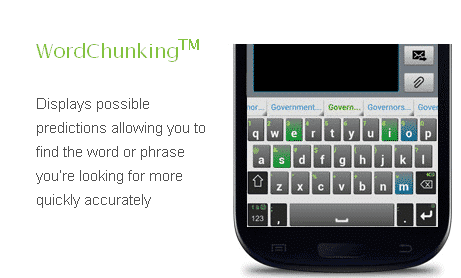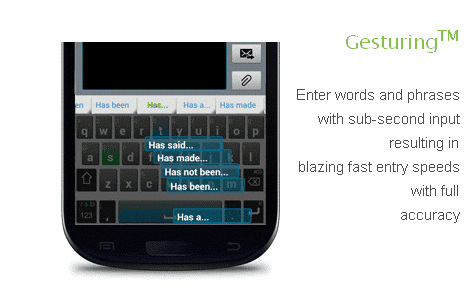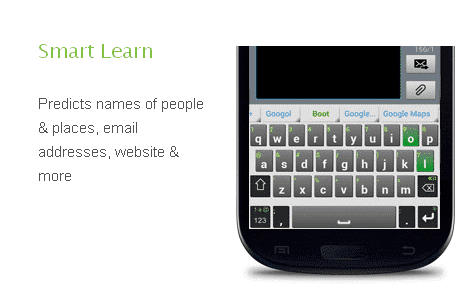Vancouver’s WordLogic Awarded U.S. Patent for Predictive Keyboard Technology

WordLogic CEO Frank Evanshen. WordLogic (OTC:WLGC), a Vancouver-based software developer that focuses on predictive data entry, analytics and retrieval software for personal computing devices, including mobile, QWERTY keyboards, touch screen, smart TVs, automotive navigation systems, media players and gaming consoles, has just been awarded a U.S. patent for “method, system, apparatus and computer-readable media for directing input associated with keyboarding-type device”.
Wait a minute, you might ask yourself, don’t I already use this several times a day across all kinds of devices? Yes, you do. “The value of this patent is readily apparent since all prediction technology today uses this method of redirection to accomplish its goals and therefore all the competing methods would potentially be infringing on this patent or one of our other patents,” explained WordLogic CTO Mark Dostie in an email exchange with Cantech Letter.
But Wordlogic is no patent pure-play. The company has actively been developing their technology and signing agreements with companies who might use the technology for over a decade. This latest patent, which was awarded on October 8, was filed back on January 13, 2005, while the iPhone was still a twinkle in Steve Jobs’ eye.
Today, WordLogic’s iKnowU predictive keyboard has a strong following and a consistent 4.5 star rating on the Google Play store.
To grasp how critical predictive technologies have become for most users, one needs only look at the launch of Apple’s latest iOS7. The most talked-about missing feature was the fact their keyboard did not have any prediction capabilities, unlike its Android counterparts. And with tablets taking over from laptops for a variety of personal and business users, the demand for more predictive capabilities which can reach into both personal and business data sources is growing rapidly.

Sizing up the future impact of WordLogic’s patent portfolio, Dostie says, “With this latest award WordLogic has been awarded 8 different patents covering a vast number of predictive technologies which it has developed over the past decade. WordLogic continues to file additional patents in this area and has a large number of patents pending both in the US and internationally.”
WordLogic originally began developing predictive technologies designed for the Palm Pilot and then the Compaq iPaq device, back when CPU and memory capacities were quite limited and designing a system capable of holding over 100,000 retrievable words presenting themselves as fast as a user could type was a much greater challenge then than it is now. Although now that computers are finding themselves embedded in watches, eyeglasses, wristbands and headbands, TVs and fridges, etc. the need for packing a responsive data retrieval system into a compact form remains crucial.
And then there’s language. Dostie explains, “our technology has to work as well for Korean as it does for English, Spanish, German or French. We are constantly testing our new versions with various languages and working with expert linguists to identify differences and areas for improvement.”

Where the “predictive” aspect comes in is that as a user types, the software guesses what the user means and provides a list of possible next words and phrases, to save the user time spent typing full words. WordLogic’s innovation expresses itself in the retrieval and redirection aspects of how the software guides the user. Compared with typically horizontal data-prediction systems, WordLogic’s technology appears to be more in the skyscraper construction business. One commentator opined that “WordLogic’s technology is to simple predictive text-messaging software what chess is to checkers.”
The company’s latest product is REACH, which adds a layer of context and location awareness to the existing predictive text analytics. While an exclusive licensing agreement regarding REACH is currently being negotiated with “a major global handset manufacturer”, plans to release the technology to the public are in place in the event that an agreement is not reached.
The potential for REACH technology lies in its capacity to keep a user within its ecosystem. For example, when someone on a smartphone searches for a local service or restaurant or something, they’d typically have to open up a separate app. REACH serves the same information you’d seek externally without the need to open multiple apps. And this has obvious implications for companies competing in the mobile advertising market.

With so many companies and marketing agencies looking to capitalize on the current imperative to combine real-time marketing, social media ad exchanges and the application of predictive analytics for ad placement, Dostie sees the future of its predictive text retrieval system entwined with this sort of discreet advertising.
“REACH technology allows WordLogic to monitor the user’s typing to find keywords in context and then use that information to help the user find information they might be interested in, he says. “For example, if the user types a name of someone REACH will locate the contact information and make it available to the user. If they write about a meeting they have coming up it will locate the information in their calendar or if they write about having pizza it will find the closest pizza restaurant to them and even offer them a coupon for a discount if one is available. All of this occurs in a non-intrusive manner little a small icon appearing at the bottom of the keyboard to indicate the information has been retrieved.”
Asked how he sees WordLogic’s technology playing out over the next 10 years, Dostie replied, “Predictive technologies will soon fully manage all aspects of homes, apartments and office buildings and it will be used to drive your car, manage traffic and optimize travel routes and timing of cargo delivery or tankers into a harbor. Sensors will monitor machine operations and allow you to predict when it’s about to fail and what maintenance or repairs and needed and when. Predictive technologies will reduce the unfortunate events, the banal activities and the mundane tasks we perform each day while increasing the relevance and value of the information and actions we do take personally.”
_______________

Terry Dawes
Writer
